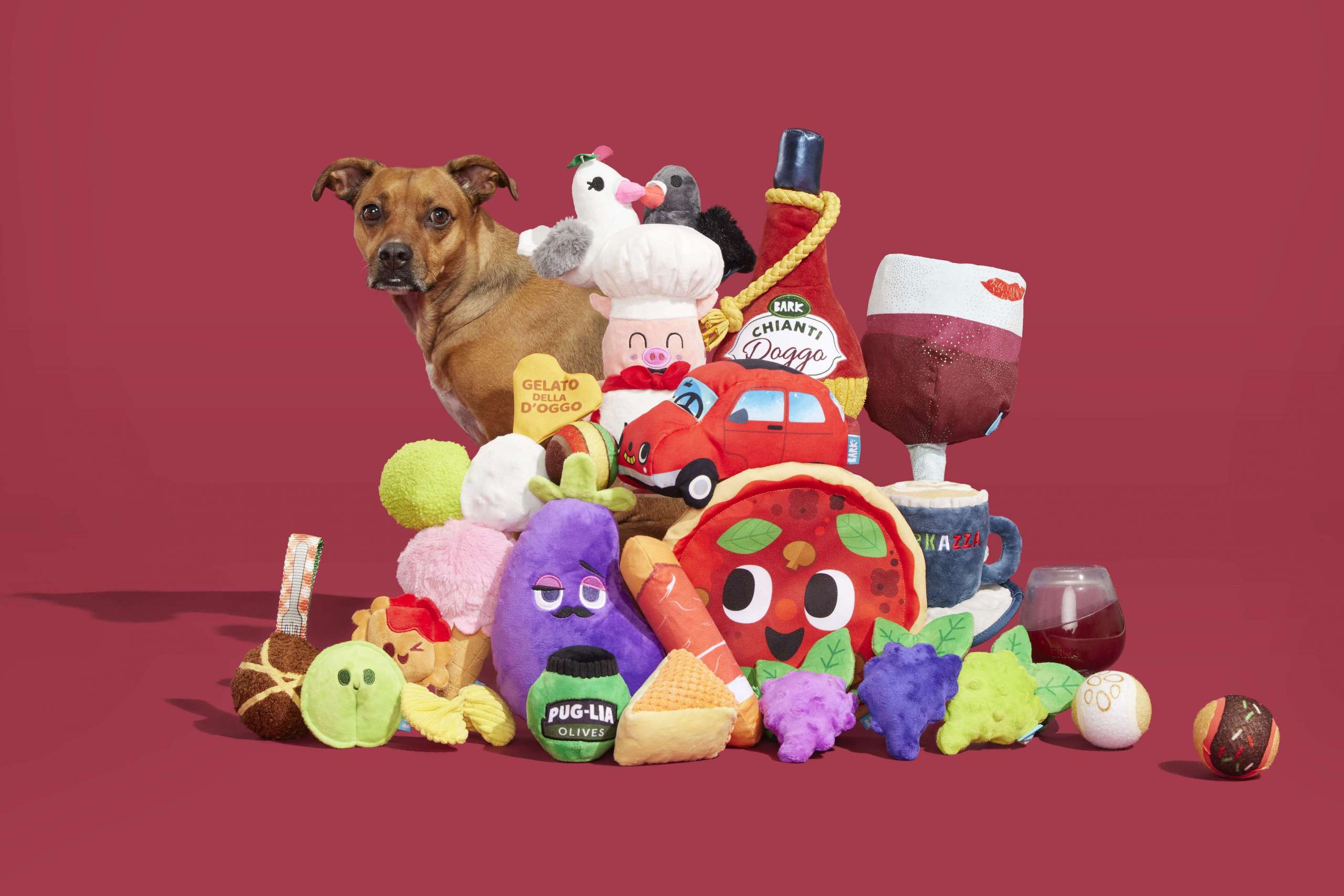Whether looking out over a scenic landscape or curling up at your feet, Bernese mountain dogs are truly majestic. Originally bred as farm dogs, these pups are strong, sturdy, and eager to please their owners. Known for their tri-colored coats (black, white, and reddish-brown), most Bernese mountain dogs have mid-length, shaggy fur and naturally floppy ears. They’re commonly mistaken for their distant relative, the Swiss mountain dog, who shares similar colors, but has a shorter coat.
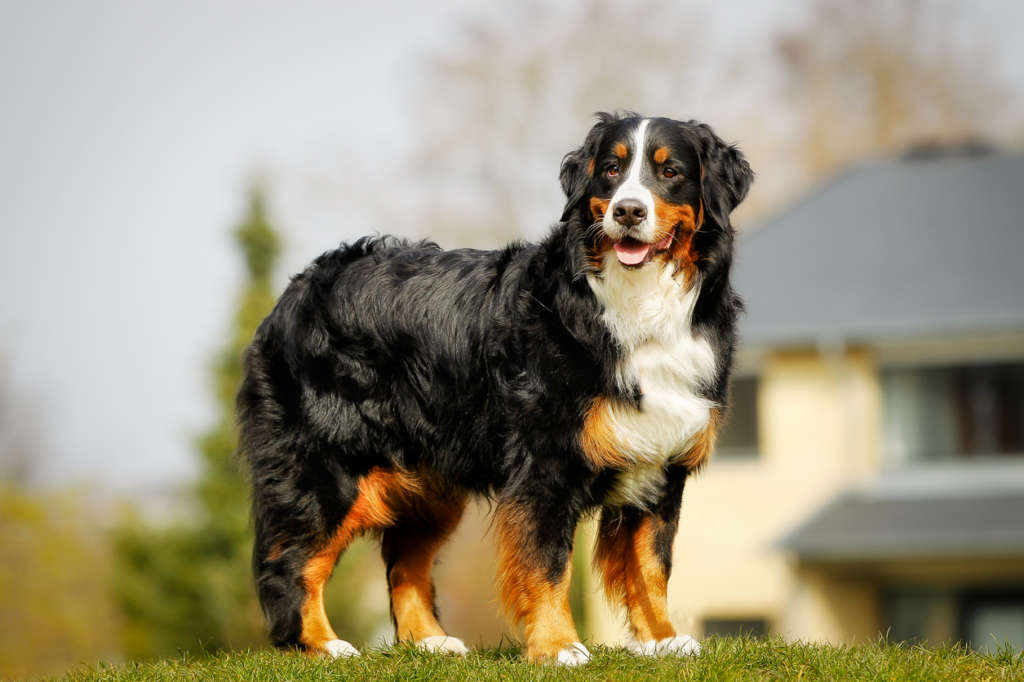

Bernese mountain dogs stand tall and wide on their powerful haunches, making them excellent watchdogs due to their attentive and vocal nature. However, they can be equally affectionate companions. And despite their regal look and pedigree, this breed is happy-go-lucky and eager to relax alongside their favorite human.
Breed Overview
Bernese Mountain Dogs Are Also Known As…
Berners, Bubs, Bernese cattle dogs. Berner Sennenhund, if you ask the Germans. “Strong like bull, cute like button,” if you ask just about anyone.
What Is The History Of The Bernese Mountain Dog?
With genetic ties to the Roman mastiff, this breed originated in and around the Swiss city of Berne. Here, across the vast landscape of the Swiss Alps, dairy farmers produced the essential ingredients for popular Swiss exports like delectable chocolate. Swiss farmers originally used the Bernese mountain dog to pull carts, herd animals, and serve as guard dogs. Their strength and intelligence made them essential for daily tasks, though they remained trusted companions even when the workday was done.
With increasingly modernized and mechanized farms, the need for the Bernese mountain dogs waned, and their number began to diminish until breed enthusiasts stepped in to save the day (and the dog). Professor Albert Heim, a renowned European dog expert, created the first breeding club for the Bernese mountain dog to help revitalize and preserve the breed.
Soon, Berners were popping up in households across Switzerland and making their debut overseas. In 1926, a Kansas farmer welcomed two Berner pups into his farm, and their popularity grew quickly from there. A little over a decade later, the American Kennel Club officially recognized the Bernese mountain dog breed. Today, these mammoth pooches can be found across America and all over the globe.
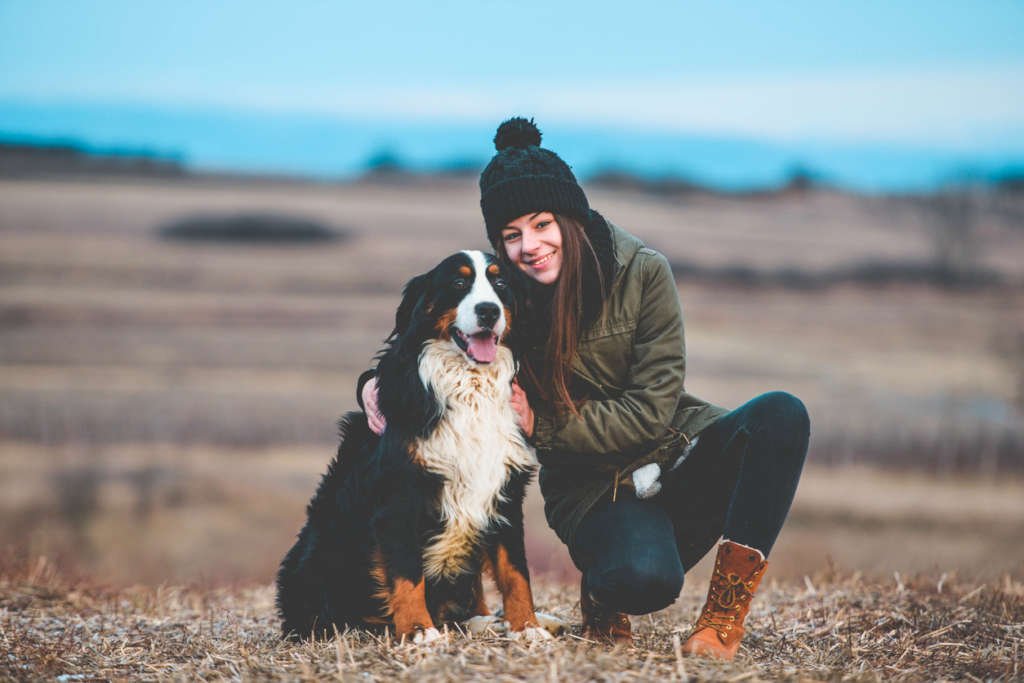

How Big Do Bernese Mountain Dogs Get?
Male dogs and female dogs vary in size and weight. The difference boils down to a couple of inches for this large breed. However, males and females can vary in weight by 10-20 pounds. The average size for this dog breed is:
Height: 23-27.5 inches
Weight: 70-115 pounds
How Long Do Bernese Mountain Dogs (Generally) Live?
There’s an old Swiss saying, “Three years a young dog, three years a good dog, and three years an old dog. Anything more is a gift from God.”
Like many large dog breeds, Berners live 7 to 10 years.
What Is A Bernese Mountain Dog’s Temperament & Personality Like?
The bigger the dog, the warmer the soul—that’s the motto for Bernese mountain dogs (and their cousins, the Greater Swiss mountain dog). Berners are typically relaxed and easygoing, though they’re certainly not afraid to shower their owners (and friends) with affection every chance they get.
Don’t underestimate a Berner’s intelligence, either. You might think they’re big, burly oafs, but they have a long history as laborers, fulfilling complex and difficult farm chores. They are obedient and resourceful when completing tasks and typically rank high in puppy intelligence.
Are Bernese Mountain Dogs Good With Kids? Cats? Dogs?
These peaceful pups are rarely, if ever, aggressive, making them ideal family pets. Berners have plenty of energy and patience around small children, and because of their robust nature, they can handle their fair share of roughhousing. That being said, it’s essential to teach youngins to treat Berners gently and supervise your little ones while they pet and play with your new pup.
The same goes for other pets. Berners are unlikely to act aggressively toward other dogs or cats in your household, though they may enjoy chasing the occasional squirrel, raccoon, or other small mammals. So long as you create a welcoming, safe environment for all your furry friends, you should look forward to a harmonious household.
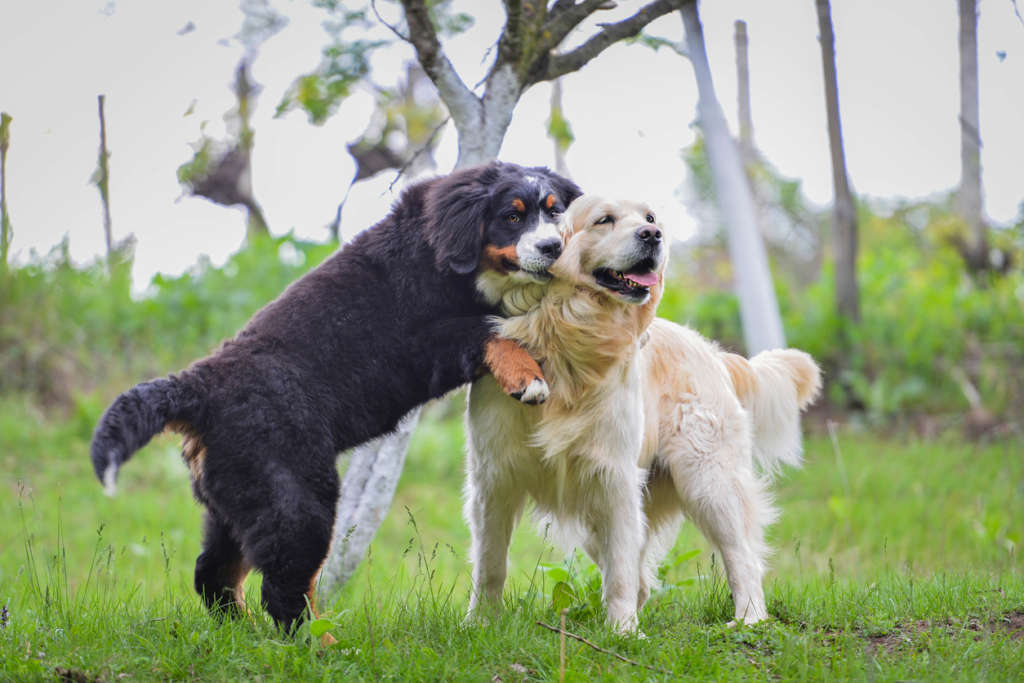

Are Bernese Mountain Dogs High Energy?
Like boxer dogs and Australian shepherds, young Bernese mountain dogs are known for their wily spirits—running, jumping, and playing to their heart’s content. What else could you expect from a puppy? After the dog-year equivalent of the “Terrible Twos,” Berners tend to mellow out and take things a little slower.
While Berners are incredibly strong, they don’t have the highest endurance levels. A moderately-paced 30-minute walk every day should be enough to keep your dog physically fit and fulfilled. Beyond that, you might look for ways to exercise your pup’s active mind. Games, food puzzles, and interactive tasks might be more interesting to your Berner than a classic W-A-L-K.
Are Bernese Mountain Dogs Hard To Train?
Training should be relatively easy whether you’re housebreaking your pup or teaching them a new command. Berners are deeply motivated by their owner’s approval, so you’ll want to offer positive reinforcement at every turn.
Pets, pats, and treats will go a long way, but be careful not to overfeed your Bernese mountain dog. Break up their tasty rewards into small, bite-sized pieces. And don’t worry, it’s impossible to overload your pup with praise. Make sure your Berner knows when they’re being a good dog.
Do Bernese Mountain Dogs Have Health Issues?
For big dogs, including Berners, joint problems are common. Like Rottweilers, elbow and hip dysplasia have been known to affect this breed. Fortunately, there are treatments available to minimize the impact on your dog’s quality of life, should they need them.
Additionally, Bernese mountain dog owners should be aware of the possibility of bloat, a dangerous stomach condition that may appear quite suddenly. Watch for symptoms including restlessness, swelling, and nausea.
As with all dogs, preventative screening and routine care can help you predict or prevent health problems in the future. Consult your veterinarian about health concerns when adopting to ensure you can protect your pet and provide them with a happy, healthy life.
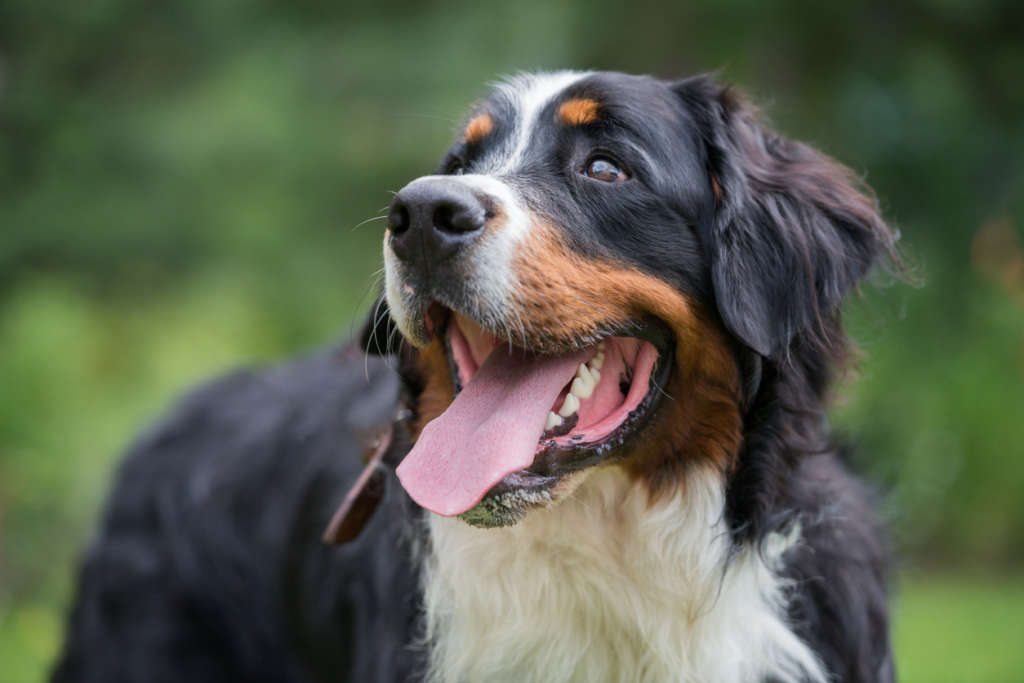

Do Bernese Mountain Dogs Need To Be Groomed?
There’s no need for regular haircuts or trims for your Bernese mountain dog, but nail clipping and teeth brushing are part of regular care for all canines.
Hoping to keep your Berner’s coat silky soft? Stock up on shampoo for an at-home spa day. Every 2 to 3 months, give your dog a little dip to keep them looking and smelling fresh. Or, take them to a professional groomer for an all-out spa experience.
Do Bernese Mountain Dogs Shed?
Yes, “the bigger the dog, the warmer the soul,” but we forgot to mention, “the larger the pile of hair on the brand-new couch.” Because of their wooly double coat, Bernese mountain dogs typically shed all year-round, with heavy seasonal shedding once or twice per year. Break out the vacuum, grab your brush, and get to work. Hey, at least you’ll have your Berner by your side to keep you company.
How Much Does It Cost To Care For A Bernese Mountain Dog?
Like all dogs, Berners can be a big responsibility—emotionally and physically as well as financially. Food, vet care, and pet essentials can easily add up to $150 to $200 per month. That’s before factoring in adoption fees and other one-time costs.
You can ask to split the bill with your Berner, but they almost never carry Benjamins. Luckily, they’re worth shelling out a little extra cash for.
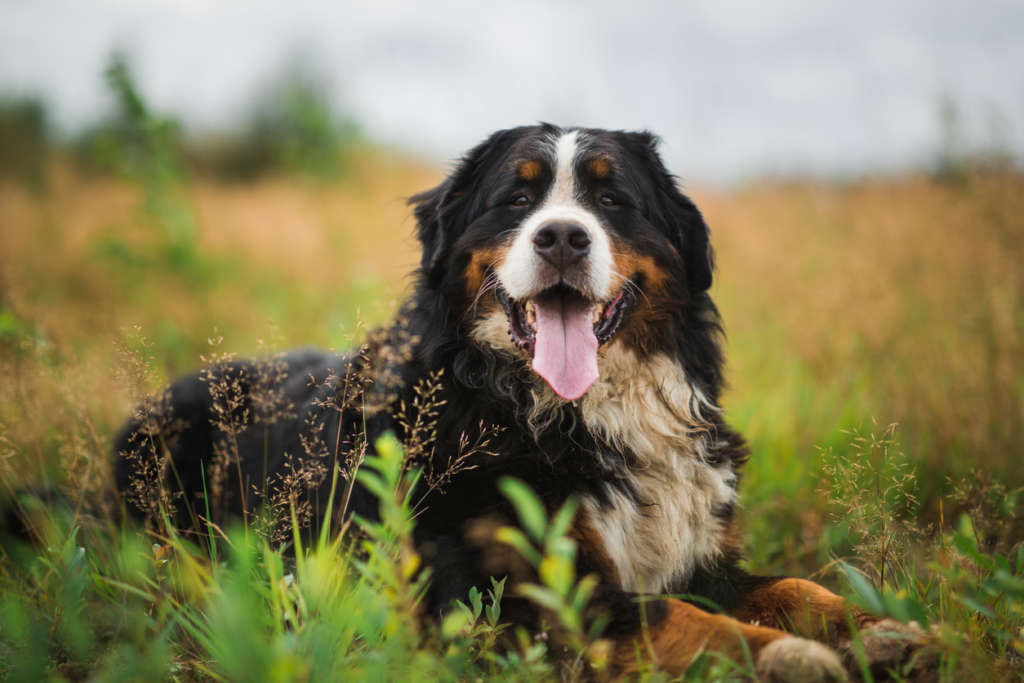

Food
First, you’re going to need food—a lot of food. What else would you expect from a super-sized dog? Berners have big appetites and can eat 3 to 6 cups of food per day. That means you could be paying $30 to $90 per month on food.
Looking to save without sacrificing quality? BARK Eats offers nutritious food designed especially for your breed at an affordable price. Your Bernese mountain dog will appreciate the delicious, perfectly portioned meals formulated by veterinary nutritionists, and you’ll appreciate having chow delivered straight to your door. It’s a win-win, especially when you can get 50% off your first month!
Routine Vet Care (Healthy Dog)
Your Berner might not enjoy the trip, but every dog deserves at least one yearly visit with a veterinarian. A standard appointment typically costs about $50 to $75 depending on your area and doesn’t cover treatments or additional health screenings.
Preventative Medications For Bernese Mountain Dogs
Keep your Berner safe from disease and pests by opting for regular heartworm treatments, vaccinations, and flea and tick prevention. Each of these can cost anywhere from $30 to $200, but it’s well worth the price to protect your pup and ensure they have the best life possible.
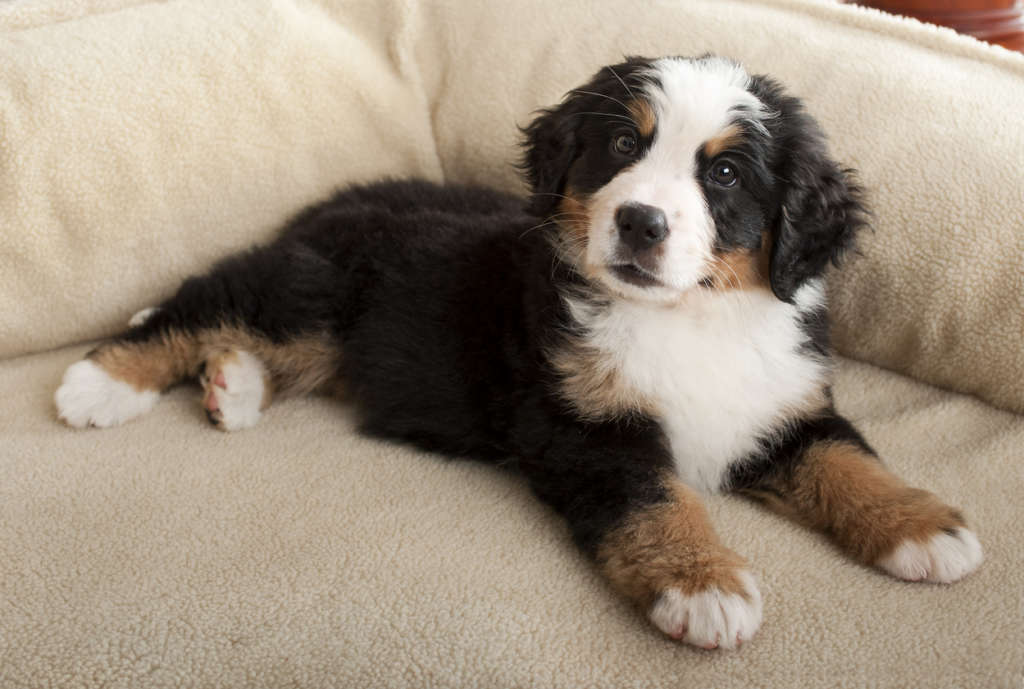

Bernese Mountain Dog Grooming
Expect to spend $30 to $100 on all the brushes, nail clippers, and puppy shampoos you’ll need to help groom your Bernese mountain dog.
You could also make your life a little easier by budgeting for seasonal grooming sessions with a professional. Service could cost between $50 and $100, and you may be charged a bit extra due to the sheer size of your Berner—yes, there’s a lot of puppy to love, but also a lot to lather and rinse.
Toys, Treats, Beds, & Accessories
Your colossal canine deserves some hearty treats. Make sure your purchases are properly sized for larger dogs, as smaller toys and chews could be dangerous if swallowed.
Before venturing out to the local pet store, consider making a list of puppy essentials for your Berner, including:
- Large dog bed ($60–$100)
- Comfortable leash and collar ($40–$60)
- Large dog crate ($100–$200)
- Food and water bowls (~$25)
If you’re planning on taking your Bernese mountain dog adventuring, you might also want to invest in a durable seat cover ($50–$100) to protect your upholstery from muddy paw prints.
Make your Berner’s month by signing up for BarkBox. Starting at $23 a month, you’ll receive 2 toys, 2 full-size bags of treats, and a delicious chew. Upgrade to the Super Chewer subscription, priced at $29 a month, for 2 fluff-free, durable toys, 2 full-size bags of treats, and 2 meaty chews (DOUBLE YOUR FIRST BOX FREE!)
Sources:
American Kennel Club. Bernese Mountain Dog. https://www.akc.org/dog-breeds/bernese-mountain-dog/
Bernese Mountain Dog Club of America. BMDCA Info Series.
https://www.bmdca.org/breed_education/pdf/01_bernese_basics_about.pdf
Pet MD. Bernese Mountain Dog. https://www.petmd.com/dog/breeds/c_dg_bernese_mountain_dog


